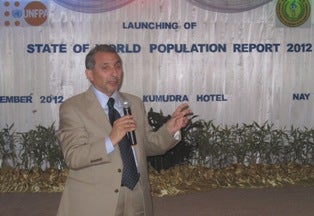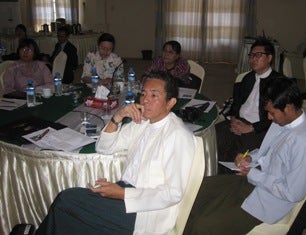“By choice, not by chance: family planning, human rights and development”
NAY PYI TAW, Myanmar — UNFPA and the Ministry of Health jointly launched the 2012 State of World Population Report, which highlights access to family planning as an essential human right that can unlock unprecedented rewards for socio-economic development.
A wide range of stakeholders from government, national and international non-governmental organizations, the United Nations and the diplomatic community attended the event.

In her opening address, Dr. Nilar Tin, Deputy Director General of the Department of Health, indicated that the Ministry of Health has attached priority to maternal and child health care in its National Health Plan for Myanmar. She also stated that the Ministry of Health established a national budget line to cover part of the needs for birth spacing commodities in Myanmar. Dr. Nilar Tin emphasized the importance of cooperation among ministries, UN agencies and non-governmental organizations in meeting the goals set out in the National Health Plan. She welcomed the call by the State of World Population report 2012 for better financial and political commitments for family planning services.
Mr. Mohamed Abdel-Ahad, Representative of UNFPA highlighted family planning as a human right which enables individuals and couples to decide on the number, timing and spacing of their children. He elaborated on the health and socio-economic benefits of family planning and explained that family planning can save the lives of women and infants since it enables women to avoid unintended and unwanted pregnancies and abortion. Mr. Abdel-Ahad said; “Nearly one quarter of Myanmar women of reproductive age have expressed desire to practice birth spacing but do not have access to contraceptives.” He commended the political commitment of the Government towards reproductive health and family planning, and mentioned that meeting the country’s needs for contraceptives, estimated at $5.8 million in 2012, is crucial to reducing maternal and infant mortality. He quoted Dr. Babatunde Osotimehin, Executive Director of UNFPA saying “Family Planning must be fully integrated into all current and future development initiatives, including the global sustainable development framework that will build on the MDGs after 2015”.

Dr. Theingi Myint, Deputy Director (MCH) of the Department of Health presented an overview of the national birth spacing program in Myanmar while Dr. Sid Naing, Director of Marie Stopes International emphasized the need for service providers to target families in rural areas, with low income and education, and to provide them with accessible, user-friendly family planning services.
This year’s report calls for a multipronged approach to ensure access to family planning by all women, men and young people. It suggests that countries seek to simultaneously strengthen health systems, introduce or enforce laws that protect individuals’ rights, reduce poverty, challenge harmful traditional practices, eliminate child marriage, end discrimination, remove logistical impediments and ensure a broad range of contraceptive supplies.

